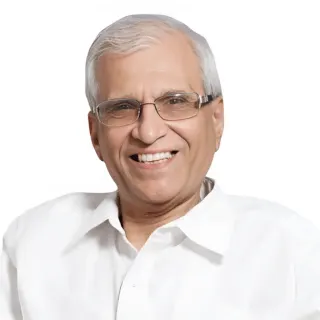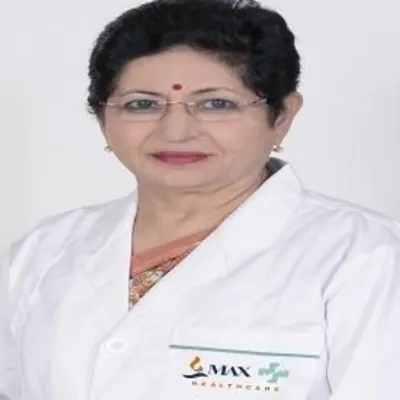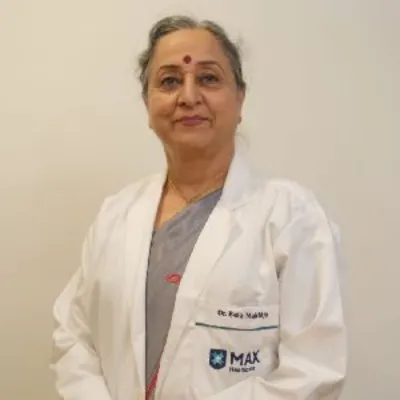Best Kidney Transplant Specialists in Artemis Hospital Gurgaon
 30 December,2025
Read More
30 December,2025
Read More
Enquire now in case of any assistance needed
 26 March,2025
26 March,2025
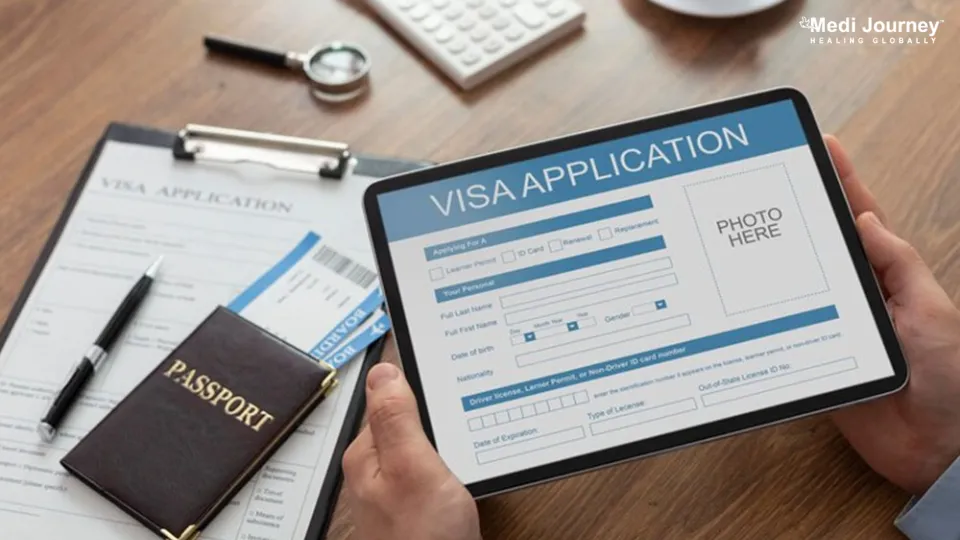
Medical tourism in India has become more than just a trend. The country has strategically positioned itself as a premier global medical destination, offering everything from complex surgical procedures to specialised treatments and traditional Ayurvedic therapies. Patients from across the globe are discovering that high-quality medical care doesn't have to come with an exorbitant price tag.
Knowledge of Indian medical visa requirements is crucial for foreigners seeking quality treatment services here. A medical visa is an important legal gateway to access specialised medical care with a smooth and legitimate process. Unlike a regular tourist visa, a medical visa for India is a bridge connecting patients with India's sophisticated healthcare ecosystem.
This article will cover the India medical visa eligibility, documentation, and applicable fees for 2025. We'll explore eligibility criteria, navigate through essential documentation requirements, and break down the applicable fees.
Fill up the form and get assured assitance within 24 hrs!
A medical treatment visa in India is a legal travel document issued by the Indian government to foreign nationals seeking quality healthcare services. It is specifically tailored to satisfy the medical requirements of patients seeking serious medical intervention from recognised and specialised hospitals. It includes both urgent and prolonged care.
It differs from a regular tourist visa intended solely for leisure and recreation. A tourist visa focuses mainly on sightseeing, exploring, and experiencing the culture of any country. On the contrary, an Indian medical visa is focused on procuring significant and specialised healthcare services,
There is something called a medical attendant visa that will accompany you in your treatment process. This visa is a gateway to a maximum of 2 members of your family or caregivers as your support in the treatment. It is available for your immediate family members or your caregivers, such as your spouse, parents, siblings, and children, but it is not limited to these categories if they are acting as caregivers.
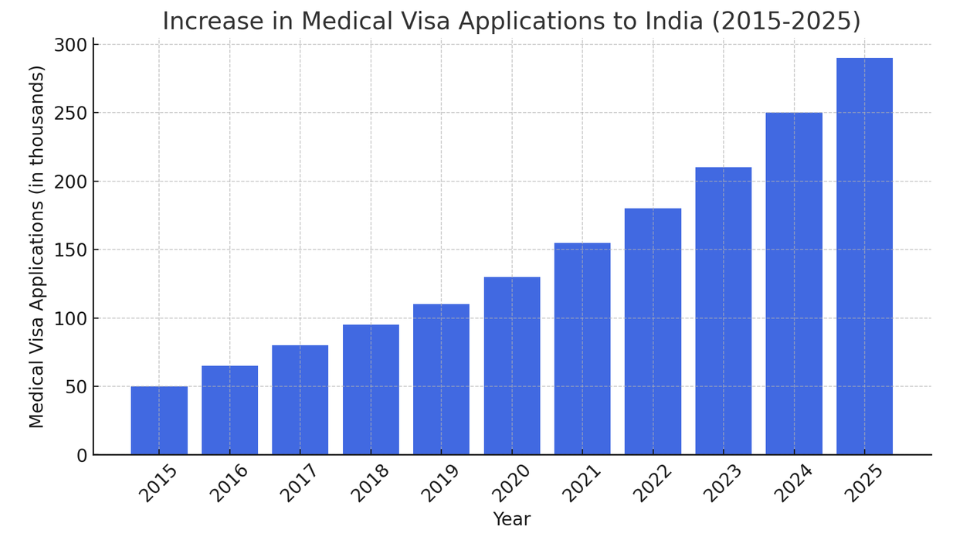
This bar graph displays the increasing number of medical visa applications from 2015 to 2025, indicating India's growing reputation as a medical tourism hub.
Indian medical visa requirements are usually determined by your need to undergo significant medical treatment here. The key eligibility criteria include:
Type of Treatment:
The visa is granted for specialised medical treatments that are not readily available in the applicant's home country. This includes procedures like heart surgery, neurosurgery, and organ transplants.
Recognised Medical Institutions:
Treatment must be conducted in recognised and accredited medical institutions in India.
Medical Documentation:
Applicants must provide medical documentation, including a diagnosis, a treatment plan, and a letter from the Indian hospital confirming the treatment proposal.
Medical Attendants:
A maximum of two attendants are allowed to accompany the patient. They must apply for a Medical Attendant Visa.
Preliminary Medical Advice:
Applicants should have received preliminary medical advice from their home country recommending specialised treatment in India.
Registration Requirements:
Upon arrival, foreigners must register with the concerned FRRO/FRO within 14 days.
Financial Requirements:
Proof of sufficient funds for medical and living expenses in India is necessary.
Yellow Fever Vaccination:
Depending on the country of origin, a Yellow Fever Vaccination certificate may be required for entry into India.
Return Ticket:
A copy of a confirmed return ticket is often required as part of the application process.
Specific Visa Duration and Entries:
The medical visa can be issued for up to one year or the duration of treatment, whichever is less, with multiple entries allowed. The e-Medical Visa allows triple entries within 60 days.
Exclusions:
Medical visas are not issued for surrogacy.
Country-Specific Eligibility for e-Medical Visa:
The e-Medical Visa has specific country eligibility criteria, which might not apply to all countries.
Health Certifications for Certain Treatments:
For specific treatments like organ transplants, additional health certifications (e.g., compatibility reports) may be required.
General Eligibility: The Indian government does not restrict medical visas based on citizenship, but certain countries are eligible for the e-Medical Visa, which is an online version of the medical visa. However, all applicants must meet the above criteria to be eligible for a medical visa to India.
Applying for a medical visa in India requires submitting a range of essential documents to demonstrate the medical treatment requirements in India. It is also valid evidence that you are prepared for your journey. While the requirements may vary slightly according to your home country, here are the essential documents that you will be required to furnish:
Now that you know the Indian medical visa requirements, you must know how to apply. Before starting your Indian medical visa application process, research well to confirm its latest requirements and procedures. You can get this information by visiting the Indian embassy or consulate office or by checking their website.
Below is a list of steps you need to follow:
Step-by-step guide:
Note: For e-Visas, no appointment is needed as it's a completely online process. However, for regular (paper sticker) visas, you might need to submit documents in person at the embassy/consulate.
Step-by-step guide:
Additional Points:
Your research for an Indian visa for hospital treatment is still incomplete, and you do not know the medical visa fees and validity. The costs and validity of your medical visa for India vary significantly depending on your home country, intended stay duration, and bilateral agreements between both nations. Here’s the basic gist of the fees and validity:
For the most accurate information, you can always contact the Indian embassy and the consulates in your country of residence. They are the right points of contact to seek specific guidance on Indian medical visa requirements.
Applying for a medical treatment visa in India could be a meticulous process. Here are some helpful tips to ease your struggles:
Navigating a health challenge is an incredibly personal journey. We at MediJourney understand that battling any form of disease requires immense courage and hope. We recognise the emotional and physical toll of seeking medical treatment abroad, and you are not alone with us by your side.
Securing the right medical visa for India is not just a process but rather a gateway to healing and renewed hope. Our team specialises in simplifying the complex Indian medical visa requirements, ensuring you can focus on what matters most: your health and recovery.
We work closely with top-tier hospitals and provide all-around support to make your medical travel as smooth as possible. This includes assistance with multiple-entry visa options that allow you to maintain connections with your treatment centre and home.
Ready to simplify your medical stay? Let MediJourney guide you today! Contact us now!
Fill up the form and get assured assitance within 24 hrs!
B.Sc in Media Science, NSHM Knowledge Campus, Kolkata, 2019-2022
Suryani Dutta is a passionate content writer with a background in media studies, equipping her with a deep understanding of storytelling, audience engagement, and digital trends.
With over 21 years of experience, Dr. Nitin Goel specializes in Pediatric Urology (post urethral valves-hydronephrosis), Pediatric Laparoscopic Surgery (Appendicitis / abdominal cyst), Pediatric thoracic and Video Assisted Thoracic Surgery (VATS), etc....
Senior Consultant
Medical Oncologist
Nanavati Super Specialty Hospital, Mumbai
WhatsApp UsSenior Director
Gynecologist and Obstetrician, IVF Specialist
Max Super Speciality Hospital, Shalimar Bagh, New Delhi
WhatsApp UsSenior Director
Gynecologist and Obstetrician, IVF Specialist
Max Smart Super Speciality Hospital, Saket, New Delhi
WhatsApp UsSenior Director
Gynecologist and Obstetrician
Max Smart Super Speciality Hospital, Saket, New Delhi
WhatsApp UsSenior Director
Gynecologist and Obstetrician
Max Smart Super Speciality Hospital, Saket, New Delhi
WhatsApp UsSenior Director
Gynecologist and Obstetrician
Max Smart Super Speciality Hospital, Saket, New Delhi
WhatsApp UsThe Art of Effective Communication
 30 December,2025
Read More
30 December,2025
Read More
 24 December,2025
Read More
24 December,2025
Read More
 23 December,2025
Read More
23 December,2025
Read More
 17 December,2025
Read More
17 December,2025
Read More
 16 December,2025
Read More
16 December,2025
Read More
 10 December,2025
Read More
10 December,2025
Read More
Trusted by Patients
"I am Asim from Bangladesh and was looking for treatment in India for neuro. I visited many websites to get the complete information regarding the treatment but I was not satisfied as I was getting confused. In the meanwhile, one of my friends suggested I seek help from Medi Journey as he experienced his medical journey very smoothly and was satisfied with it. They have filtered the top 10 doctors as per experience, the success rate of surgery & profile, so it helps us to choose the best treatment in India. "
"For my knee surgery, Medi Journey guided me to BLK Hospital where I received exceptional care. The team's support and the expertise at BLK Hospital exceeded my expectations. Thank you Medi Journey for making my medical journey stress-free. "
"I came from Iraq for my granddaughter's eye surgery in India facilitated by Medi Journey, due to critical cases they advised us to get a second opinion from the different hospitals before going to surgery. Finally, we went to Fortis Escort Hospital, which helped us to get more confidence for diagnosis. Fortis Escort Hospital has the best eye surgeon team with the latest instruments. Thanks to all team members for providing a high-quality treatment in India at an affordable cost. "
"I came for my hair transplant in India, before coming I was so confused about choosing the best clinic and surgeon for me. But thanks to God one of my friends had a hair transplant in India through Medi Journey. He recommended me to go with them. I am completely happy with my experience with them. They were always very fast in their responses to me. the success rate of my hair transplant surgery is 100%."
"Artemis Hospital, suggested by Medi Journey, turned out to be a great choice for my treatment. The personalized assistance and medical care were exceptional. I'm grateful to Medi Journey for guiding me to a hospital that perfectly matched my needs. Highly recommended! "
"I came from Afghanistan for my treatment in India at Jaypee Hospital, Noida. I had a fantastic experience with Medi Journey. Kudos to them for their incredible support during my medical journey. They not only took care of all the logistics but also connected me with a fantastic healthcare team. Efficient, caring, and highly recommended for a hassle-free medical tourism experience."
"I am Adam from Kano, Nigeria, one of my friends from Nigeria was facilitated by Medi Journey, and he recommended us to go with them. I sent my all reports to them and within 48 hours they reverted with 4 options from different hospitals. They helped me to get a Visa letter from the hospital, arrange pick-up from the airport, and book a hotel for me. Their team is very honest and throughout our stay in India they are with us they are caring for us like his family members. BLK Hospital is the best hospital in India with a top surgical oncologist surgeon team, a very advanced OT, and a Radiotherapy department. I wish more success to Medi Journey. "
"Great experience at the Max Hospital for my spine surgery and was successfully done. I thank my neurosurgeon and his entire team. I recommended all of my country's people to Medi Journey for treatment in India, they choose the best hospital, the best doctors, and the best cost for patients."
"I came to India from Dhaka, Bangladesh for my father-in-law's cardiac surgery at Fortis Hospital. I was confused about choosing the best surgeon for him before coming, but their team helped me to choose the best hospital and best cardiac surgeon in India with very good cost and 100% success rate of surgery. I am very happy with the services, really they make my journey so comfortable that make me feel at home. Thanks again and I like people to choose "Medi Journey" as your travel guide. "
"I am Mohammad from Bangladesh came to India for my general health checkup. Medi Journey offers me the complete package including Pick-up from the airport, hotel services, and 24-hour assistance. They guide you to choose the best hospital in India, the best cost of treatment with top-most doctors and give you complete information about hotel booking, and pick-up from the airport before coming to India They have the best team to help. Always choose Medi Journey for your treatment in India."
